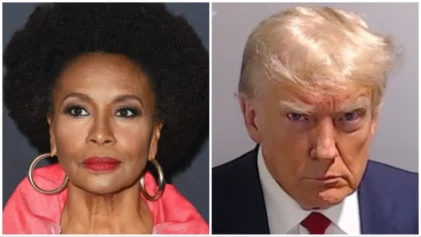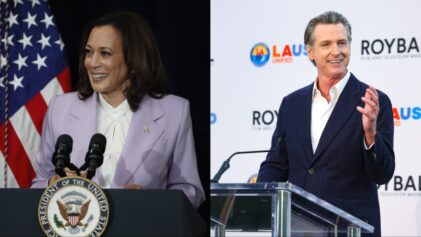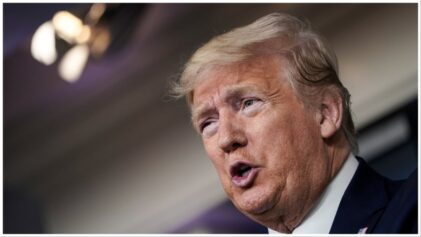Welcome to the dystopian reality that is Trump’s America. Muslim people are barred from entering the country, the Dakota Access pipeline is forcefully built by executive order and a dividing wall may slice across the U.S. Mexican border. Increasing social media and eyewitness reports of ICE raids and immigration checks have thrown families into a perpetual state of fear.
But, while we wait on what the Trump administration will do next, Black people should remember a promise made by the “orange” man back in September, a promise that will seriously threaten the safety of Black lives already under attack in this country. That promise was Trump’s vow to make New York’s stop-and-frisk policies national.
Donald Trump has stated numerous times his intentions to nationalize stop-and-frisk policies, first during a Sept. 21 Fox News interview when asked about violence in the Black community, he said: “I would do stop-and-frisk. I think you have to. We did it in New York and it worked incredibly well and you have to be proactive and you know you really help people change their mind automatically.” He even brought up nationwide stop-and-frisk at the first presidential debate, claiming that “stop-and-frisk had a tremendous impact on the safety of New York City, tremendous beyond belief.” Trump then preceded to deny that stop-and-frisk policies as they were practiced in New York were deemed unconstitutional by a federal judge. But, they were.
Donald Trump endorsed stop-and-frisk policies to appeal to issues of gun violence affecting communities of color in cities like Chicago. In his first address to congress, Chicago was a continued reference point as he harped on inner-city gun violence and proposed forming a taskforce. How Trump actually intends to enact national stop-and-frisk remains unknown. What is known, however, is that stop-and-frisk polices are inherently racist and greatly increase interactions between law enforcement and nonwhite people. As extra-judicial killings of Black people by police continue, it is clear that a national stop-and-frisk effort would greatly increase the frequency of these killings. With Trump in office, it is time to take his calls for national stop-and-frisk seriously.
Here is what we can expect if Trump puts national stop-and-frisk into action:
1) More Police-Involved Killings of Black People
I grew up in New York City during the era when stop-and-frisk policies aggressively targeted and profiled Black and Latinx people. Stop-and-frisk hot spots were located outside train stations, building entrances and along residential blocks. In my home borough, the Bronx, I watched as people were stopped and frisked on the subway trains. The Operation Clean Halls program initiated by NYPD even allowed officers to conduct stop-and-frisk procedures inside of apartment buildings. Street interrogations amounted to humiliation and state-sanctioned terrorism. It was not enough to manufacture Black criminality, stop-and-frisk officers commodified it in order to prove that the policy was working. Yet, during the heyday of NYC stop-and-frisk, roughly 80 percent of the people stopped were not charged with a crime. The New York Civil Liberties Union estimated that 9 out of 10 of the people stopped were innocent of any wrongdoing.
Any stop made is a possibly deadly encounter with police. It is well documented that stop-and-frisk policies overwhelmingly target Black and Latinx people. According to a New York Civil Liberties report, during the 12-year period that New York Mayor Bloomberg was in office, over five million stops were made. Black people accounted for 52.4 percent of those stops. When Black people are targeted by officers, it is only common sense that the number of police-involved shootings is going to increase.
2) More Police Non-indictments for Killing Black People
More police-involved killings mean more disappointments. There is said to be at least 1000 police killings a year, yet there have been only 13 convictions since 2005. With the exception of the Terrance Crutcher case in Tulsa, Okla., no officer has been charged in any of the high-profile police-involved shootings of Black people since 2013.
With Trump in the pockets of the police unions that endorsed him, it is very unlikely that any justice will be had when the adverse effects of stop-and-frisk result in increased officer-involved killings. While he has talked about so-called “Black on Black” crime, Trump has paid virtually no lip service to the issues raised by the Black Lives Matter movement. In fact, he has made it clear on several occasions that his will be a “law and order” administration that will unabashedly support police officers. In a statement made on the White House website just days following the inauguration, Trump’s administration pledged its allegiance to the police state, saying: “President Trump will honor our men and women in uniform and will support their mission of protecting the public. The dangerous anti-police atmosphere in America is wrong. The Trump Administration will end it.”
3) Accelerated mass incarceration of Black People
In the same report conducted by the New York Civil Liberties Union, it was found that while the purpose of stop-and-frisk was to search people for weapons, only 2 percent of those stops actually resulted in the retrieval of weapons. Yet, many of the stops involved the retrieval of drugs and the conviction and imprisonment of nonwhite people for nonviolent offenses.
A national stop-and-frisk initiative could see incarceration rates double. Stop-and-frisk is a part of the practice of “broken windows” policing. When stops occur, officers are prone to arrest people and because of the pressures of police arrest quotas, Black people are targeted and arrested for such infractions as resisting arrest. Officers will reach for any justification to fill jails, including possession of small amounts of marijuana, disorderly conduct, loitering and trespassing. Economic incentives for departments make stop-and-frisk policies profitable, especially with asset-forfeiture laws that permit the confiscation of property with little to no justification.
4) Hyper-Surveillance and Profiling of Black People
Imagine police stop-and-frisk checkpoints in every major city in the United States. At these check-points, Black people are targeted and patted down, while white people are allowed to pass. In order to conduct stop-and-frisk procedures at national levels, millions of dollars would likely be poured into police departments. Technologies of surveillance, weaponization, and increased police presence in communities of color could amount to nothing short of a military occupation. Open and institutionalized racial profiling could be a reality as one of Trump’s key supporters, the Fraternal Order of Police, is calling on the Trump administration to lift a 2003 ban placed on racial profiling by the Bush administration.
Trump’s police state is shaping up to be even more aggressive and violent than the Obama years. The Fraternal Order of Police has outlined possible executive orders and policies for the administration, including increasing police militarization and the scrapping of the Obama-era Taskforce on 21st-Century Policing. With four years of Trump still ahead of us, Black people must stay vigilant in the fight for Black lives, especially as the federal government moves to further de-prioritize the issue of extra-judicial killings. In a Trump America, it is, as it has always been, up to Black people to fight for and protect ourselves.
Dubian Ade is an artist, writer and activist from Bronx, N.Y. Ade also is the editor of The Decolonizer magazine.


